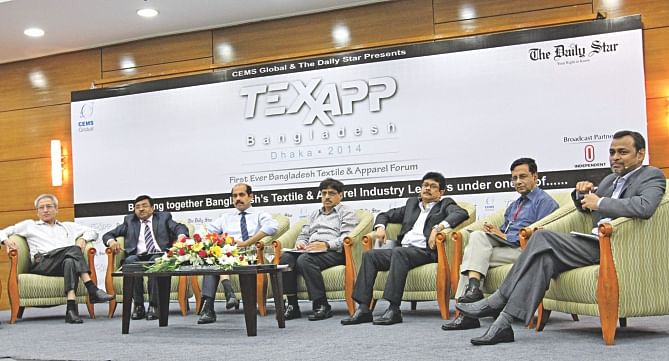Political stability key to garment export growth: economist
Political stability key to garment export growth: economist

Long-term political stability is necessary for the continued growth of garment exports, a World Bank economist based in Dhaka said yesterday.
“We need a stable political situation for sustained growth of garment exports,” Zahid Hussain, lead economist of the WB's local office, said at a discussion on textile and garments, TexApp Bangladesh.
CEMS Global, an event management company, and The Daily Star jointly organised the discussion at Bangabandhu International Conference Centre where international retailers, machinery suppliers, policymakers and entrepreneurs were present.
“We also need to address the infrastructure bottlenecks to smooth the running of our businesses,” Hussain said.
Government policies must be reformed to become more business-oriented, he said.
If these problems are addressed properly, Bangladesh has scope for attracting more investment in different sectors, he said.
Foreign investors can invest in backward linkage industries, said Atiqul Islam, president of Bangladesh Garment Manufacturers and Exporters Association.
“The local entrepreneurs have invested in the garment sector over the years. They have developed a lot, both in terms of garment products and markets. So we don't need foreign investment in the basic garment sector anymore,” Islam said.
“We need a pool of skilled people for the garment sector, as we have already started suffering from the absence of skilled manpower for the sector,” he said.
The garment sector passed the worst time in 2013 when the Rana Plaza building collapsed killing more than 1,000 workers, but the country has been gradually overcoming the shocks. “We are expecting good business in the coming years,” Islam said.
Mohammad Hatem, first vice-president of Bangladesh Knitwear Manufacturers and Exporters Association, the knitters' platform, said the country needs to fix the gas crisis to keep up business growth.
“Japan is a particularly promising market of $35 billion garment consumption a year and our exports to the country are increasing,” Hatem said.
The government has already cut import duty on import of fire safety equipment to zero for sake of workplace safety in the garment sector, said Syed Md Aminul Karim, member of the National Board of Revenue.
“The government will lose Tk 2,000 crore from the duty waiver on safety equipment imports,” he said.
Akhtaruzzaman Khan Kabir, chief executive officer of Bang-ladesh Tourism Board, SM Mahbubur Rahman, director general of Export Promotion Bureau and Sohel Ahmed, chief operating officer of Aamra Resources Ltd, also spoke.